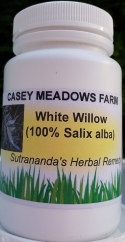Health benefits of White willow bark
Salix alba
 White Willow (also known as Salix Alba in Latin), also
called weeping willow, has been celebrated for its pain
and inflammation alleviating abilities for
hundreds of years. Salicin is contained within the white
willow tree’s bark, an analgesic compound that
acetylsalicylic acid (aspirin) is derived from. Today,
herbalists often suggest white willow bark for its
benefits in dealing with headache,
temperature, arthritis,
and other disorders characterized by irritation and
pain, including cardiovascular disease.
White Willow (also known as Salix Alba in Latin), also
called weeping willow, has been celebrated for its pain
and inflammation alleviating abilities for
hundreds of years. Salicin is contained within the white
willow tree’s bark, an analgesic compound that
acetylsalicylic acid (aspirin) is derived from. Today,
herbalists often suggest white willow bark for its
benefits in dealing with headache,
temperature, arthritis,
and other disorders characterized by irritation and
pain, including cardiovascular disease.White willow is the original or natural Aspirin and has nearly the same indications as for its synthetic counterpart. Where these two compounds differ though, is that white willow tends to be milder on the stomach lining than synthetic Aspirin and has a reduced anticoagulant action.
This herb has been used for millennia for natural pain relief, reducing fever and inflammation, and recent studies are proving the traditional indications of white willow to be correct.
In the herbal treatment of rheumatoid arthritis and lower back pain, a daily dose of 3 x 60 mg standardized white willow tablets led to a dramatic reduction in other pain medication being required. Over an eight week period, 97% of participants reported a reduction in their pain and 18% reported no pain at all.
White willow bark is one of the herbs used for migraine and headache treatment.
The use of white willow bark is also indicated for fibromyalgia, post surgical pain, Crohn’s disease, warts treatment and any condition characterized by pain and inflammation.
The active compounds in white willow, called salicylate glycosides, work as an effective anti-inflammatory by interfering with pain transmission in the nervous system and by treating the cause of inflammation.
While it is understood to have an anticoagulant action similar to Aspirin, this action is greatly reduced in white willow but still warrants supervision if using synthetic anticoagulants.
The long-term use of non-steroidal anti-inflammatory drugs (NSAIDs) has become a cause for concern due to its effect on the gastrointestinal tract, where bleeding, gastric erosion and more recently, cardiac problems are potential side effects.
The benefit of using white willow is that reduction in NSAIDs is achievable and that they can still be used to reduce pain as required.
Side Effects and Possible Interactions of White Willow BarkModerate care should be used when using white willow. While white willow is gentler on the stomach than Aspirin, it can aggravate conditions such as kidney disease and gastrointestinal ulcers. In addition, those who are sensitive to Aspirin or have an allergy to salicylates should not take this herb. It is essential to consult a health care professional when altering medications and it should be thoroughly investigated how both herbal or conventional medications interact with each other. For those taking blood thinners, including warfarin and heparin, white willow is to be taken with caution under a physician’s care. |
|
||||||

